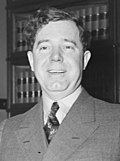| ||
|---|---|---|
  | ||
"Every Man a King" is a song cowritten by Louisiana's Governor and United States Senator Huey Long and Castro Carazo. Long was known for his political slogan "Every man a king", which is also the title of his 1933 autobiography [1] and the catch-phrase of his Share Our Wealth proposal during the Great Depression. [2] The song's lyrics include the lines "With castles and clothing and food for all / All belongs to you". [3] The song was co-written in 1935 by Huey Long and Castro Carazo, the band director of Louisiana State University, a former orchestra leader at the Roosevelt Hotel in New Orleans brought to LSU by Long himself. [4]
